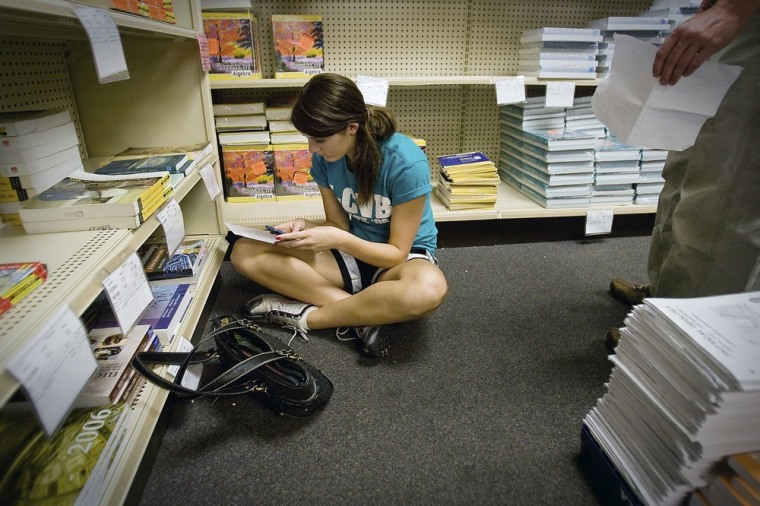For a plugged-in generation, college kids have old-school tastes in textbooks. Even as more publishers offer the choice of buying e-books for classes, students would rather lug around printed textbooks.
“We have found that digital textbooks are still not as popular with students,” said Charles Schmidt, spokesman for the National Association of College Stores.
While the price of e-books can be 60 percent to 70 percent of the paper version, a NACS poll found that 74 percent of students still want print.
That’s because most e-books are simply PDF files of the print book, and renting the paper version is still cheaper, said Schmidt.
“People don’t want to just see a PDF on a screen. They’re asking: ‘Where’s my interactive video? Where are my widgets?’” said Vineet Madan, senior VP of new ventures at McGraw-Hill Education.
Students are used to handling content online, and a plain screen isn’t worth the money, experts said.
“If it’s more interactive they’re going to see that added value and say: ‘Yeah, we will pay more for that,’” Schmidt said.
Also professors’ likes and dislikes are a big factor and they hold a lot of sway, said Schmidt. “The average professor is not comfortable” with e-books, he said. “The kids are very sensitive to that.”
Not all professors are down on e-books. Albert Greco, professor of marketing at Fordham University in New York, said that large tech companies such as Apple and Microsoft Corp. joining the market will impact the number of e-textbooks and their price.
In January, Apple launched iBooks2, an iPad-based e-reader for K-12 school texts, and observers said it’s a matter of time before it expands to college textbooks. And Greco pointed out Microsoft’s joint venture with Barnes & Noble, built around expanding e-book sales, also includes the chain’s college bookstores.
“Publishers realized they had to do something because they knew the price of textbooks kept going up,” he said, noting that they’ve tried a number of money-saving options including limited-time e-book licenses and selling single chapters online.
The top 10 textbooks in 10 popular subjects average $175 each, and price hikes have been beating inflation for years, said Nicole Allen, affordable textbook advocate of Student PIRG (Public Interest Research Group), a consumer organization.
E-books, while helpful, are not saving students enough, she said. “They are only bringing costs down so much. They’re not solving the problem; they’re making it less bad.”
Printing a book is only a small part of the price, and e-textbooks come with their own costs, explained Madan.
“You have to spend money on engineers to build the widgets and features to build these next-generation textbooks,” he said. “Yes, the paper and binding go away, but there is a new set of costs. Paper books don’t need tech support.”
McGraw-Hill supports alternatives to make e-books more affordable, Madan said. It was among the few publishers to supply textbooks for the iPad app from Inkling, which sells books by the chapter, and also provides its books through CourseSmart, which sells limited-time licenses for e-textbooks. Greco noted his marketing textbook is available on CourseSmart for about a third of the cost of a new book and chapters on Inkling are a fraction of the full book’s price.
Student PIRG is promoting another kind of e-book: open-source textbooks. Foundations and other institutions fund content, with publishers such as Irvington, N.Y.-based Flat World Knowledge delivering it to colleges and professors who can use it to create texts for their courses. Flat World, which is partly funded by publisher Random House, provides course materials for institutions such as Massachusetts Institute of Technology, Tufts University and the University of Michigan.
“The change is not going to happen overnight, but we are in the path towards change in the texbooks industry,” said Allen of Student PIRG.
But change won’t be as simple as trading a book for a tablet, warned Madan of McGraw-Hill : “It’s new value that’s created … and those things require investing.”
More from Life Inc.
